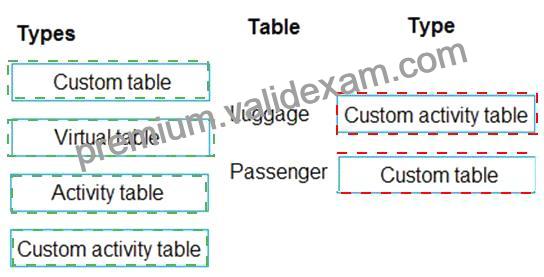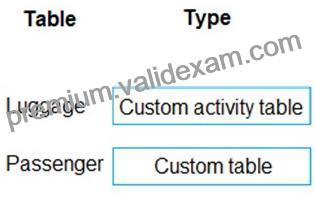
Explanation

Luggage: Custom activity table
An activity can be thought of as any action for which an entry can be made on a calendar. An activity has time dimensions (start time, stop time, due date, and duration) that help determine when the action occurred or will occur. Activities also contain data that helps determine what action the activity represents, for example, subject and description.
Passenger: Customer table
The account and contact tables in Microsoft Dataverse are essential for identifying and managing customers, selling products and services, and providing superior service to the customers. A customer address table is used to store address and shipping information for a customer.
Scenario: The company has a custom app for managing and tracking passenger luggage. The app uses Microsoft Dataverse.
Agents need to view which pieces of luggage match to each passenger, and then need to add the total on the passenger record.
Topic 2, First Up Consulting
Case study
This is a case study. Case studies are not timed separately. You can use as much exam time as you would like to complete each case. However, there may be additional case studies and sections on this exam. You must manage your time to ensure that you are able to complete all questions included on this exam in the time provided.
To answer the questions included in a case study, you will need to reference information that is provided in the case study. Case studies might contain exhibits and other resources that provide more information about the scenario that is described in the case study. Each question is independent of the other questions in this case study.
At the end of this case study, a review screen will appear. This screen allows you to review your answers and to make changes before you move to the next section of the exam. After you begin a new section, you cannot return to this section.
To start the case study
To display the first question in this case study, click the Next button. Use the buttons in the left pane to explore the content of the case study before you answer the questions. Clicking these buttons displays information such as business requirements, existing environment, and problem statements. If the case study has an All Information tab, note that the information displayed is identical to the information displayed on the subsequent tabs. When you are ready to answer a question, click the Question button to return to the question.
Background
First Up Consulting recruits information technology (IT) workers for temporary or permanent positions at client companies. The company operates offices in multiple countries/regions.
First Up has both full-time and part-time employees. The company has a team or worker support agents that respond to inquiries from current and prospective workers. Some of the worker support agents are multilingual.
The company does not have a standardized tool used for reporting purposes. The organization engages you to implement a new Power Platform solution. Workers are managed by a dedicated team that includes one primary recruiter and a contract assistant. Many client companies live in areas that do not allow for mobile data connections.
Current environment
Existing systems and processes
First Up uses an on-premises system to manage current and historical patient data including medications and medical visits.
The company plans to reference historical data in the existing system. The records held in these systems will not be migrated to the new solution except for medication information.
Employee authentication with the existing system is provided by an on-premises Active Directory instance that is linked to Azure Active Directory.
An appointment record is created for each visit with a worker. The record includes worker contact information, preferred language, the date and time of the appointment, and other relevant data. This information is reviewed by the worker’s primary recruiter.
First Up has no current capabilities for forecasting future worker needs based on the data held.
Client company visits
Before First Up signs a contract to place workers at a client company, a member of the audit team visits the company and interviews company management. Audit members use different types of devices including Android and iOS devices. First Up has no plans to require the use of a single type of device. Audit team members currently record information about workers on paper forms. Team members enter information from paper forms into the system when they return to the office.
First Up audits client companies at least once each year but may schedule additional visits based on feedback from workers that they place at a client company.
Requirements
General
There is no standardized communication tool across the company, and this causes communication issues between different teams.
First up employees must be able to contact each other by using a secure system to ask and answer questions about medical cases.
Workers must be able to communicate in near real-time with worker support agents.
Client company visits
Audit team records must be locked after they have been reviewed by a First Up manager. No further edits to the record can be carried out. This must be implemented using standard available system functionality.
Audit teams must be able to enter records of their visits to the companies where they have or may place workers. Audit teams must be able to update any necessary records with the latest information.
The solution must support tracking of security clearance information for a worker including the date, status, and certifying agency.
When a worker makes an appointment, the appointments must appear in the timeline for the worker’s contact record.
Job history information
The solution must provide a worker appointment booking system that can access worker historical job placement data.
The solution must allow employees to associate a primary recruiter with each worker. The solution must also allow multiple secondary recruiters to be associated with each worker.
Every worker assessment performed must be validated and countersigned by the primary recruiter for a worker.
Job posting data from previous work engagements must be accessible by the Power Platform solution to ensure that new job postings are accurate.
First Up staff members must be able to view and update worker records. They must be able to see current and historical job placement data on the same form in the new solution.
Worker access
The solution must support workers that speak different languages. The solution must provide automatic translation capabilities.
The solution must support near real-time communications between workers and recruiters.
Workers must be able to view their records online. Workers must be able to enter any additional information that is required by or may be helpful to recruiters.
The solution must provide workers a way to search for general information about available positions.
Workers must be able to request copies of their records by using a chatbot. Workers must be able to provide information to a recruiter as needed.
Data platform
Audit teams must have the ability to view worker information on their mobile devices.
Audit teams must be able to record data during visits to locations where workers are placed.
The solution must support the ability for a corporate governance auditing team to periodically audit the organization’s records, policies, and procedures.
Reporting and analytics
The reporting and analytics team must be able to create reports that include data from all facilities and all workers.
Management reports must present an overview of the entire organization. Other reports may be limited to specific offices.
You must create dashboards that show the status across all groups of workers. The dashboards must be embedded into the Power Platform apps. Updates to data must be displayed in near real time.
Security
Authentication for all user types must be managed by a single platform. IT teams must use PowerShell to apply security permissions for users.
Worker records must only be viewed by the recruiting office that the worker visits.
Worker still records must be archived after ten years and are then removed from the main system.
Worker information must not be deleted from the system while skill and job placement history records for the worker exist in the system.
User security roles must be customized to ensure that users are able to interact only with the specific data in which they need access.
Workers must be able to sign into a portal by using their own email address. Workers must be required to use a secure method of authentication to be able to view their data.
Alerts regarding the number of recruited and placed at client companies must be updated as background processes.
Issues
The organization reports the following issues:
Recruiters report that they cannot see historical job placement data for workers.
API usage reports show that the number of API calls made exceeds limits. This causes delays saving data.
Users cannot view Power BI reports within the Power Platform apps.
Some security clearance information for workers not visible from within the Power Platform solution.
Audit teams report that they cannot view or edit worker data when the device on which they access the solution does not have network connectivity.
The testing ream reports that one of the canvas apps is not working as expected. An error message displays as specific pages load.







Leave a Reply